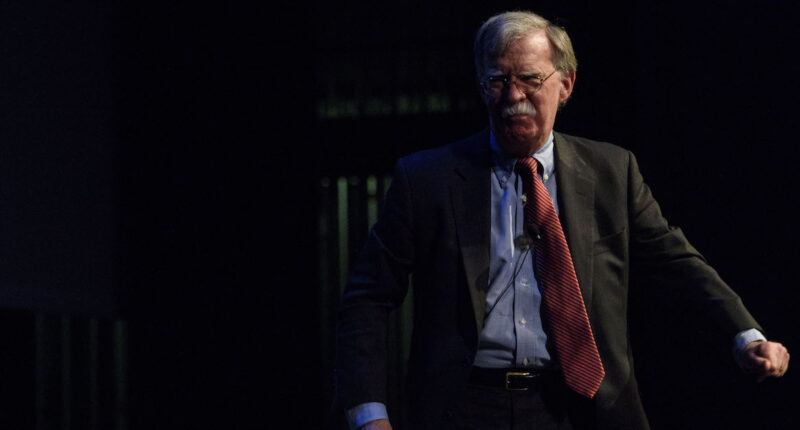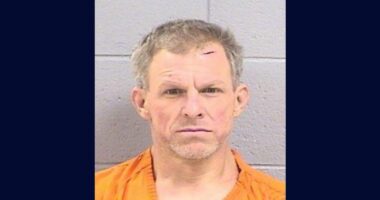Share this @internewscast.com
Former National Security Advisor John Bolton leaves the stage after discussing the “current threats to national security” during a forum moderated by Peter Feaver, the director of Duke’s American Grand Strategy, at the Page Auditorium on the campus of Duke University on February 17, 2020, in Durham, North Carolina (Melissa Sue Gerrits/Getty Images).
John Bolton was fully aware of the implications of his actions.
The former national security adviser likely understood that by sharing classified information with individuals lacking security clearances, he was in violation of the Espionage Act. His extensive experience in national security meant he was acutely aware that such behavior could jeopardize the safety of the United States. Recently, Bolton criticized Trump officials who used the public messaging app Signal to discuss a pending military operation in Yemen, mistakenly including a journalist in the conversation. Bolton’s actions, meanwhile, appear to be deliberate, unlike the seemingly careless actions of the Hegseth group.
A federal grand jury in Maryland has issued an 18-count indictment against Bolton, alleging he used personal email accounts and an encrypted messaging app to send national defense information from his diary to his wife and daughter. To make matters worse, one of these email accounts reportedly fell victim to an Iranian hack in 2021. Despite these serious breaches, Bolton failed to disclose his actions to investigators.
The Department of Justice initially began investigating Bolton’s conduct during Trump’s presidency but dropped the case when Biden took office. However, Bolton’s frequent criticisms of Trump, particularly in his 2020 book “The Room Where It Happened,” where he harshly criticized Trump’s foreign policy and deemed him “unfit for the office,” placed Bolton high on Trump’s list of adversaries, fueling Trump’s desire for retaliation.
For Trump detractors, Bolton might seem like an innocent target of Trump’s vendetta, drawing parallels with the recent indictments of former FBI Director James Comey and New York State Attorney General Letitia James. Trump’s public outbursts against Bolton and his calls for Bolton’s indictment bolster the view that Bolton is a political target of a biased Department of Justice. Bolton is expected to argue, as Comey and James have, that he is a victim of a politically motivated prosecution orchestrated by a vindictive president, and that his indictment should be dismissed.
However, alleging malicious prosecution requires proving that the charges were brought without probable cause. While such a claim might hold water in the cases of Comey and James, it is unlikely to stand up in Bolton’s situation. A quick glance at the extensive indictment reveals substantial evidence of Bolton’s misconduct, portraying him as someone who jeopardized national security not for noble reasons or because he believed it was justified, but rather for the commercial gain of selling a future book he intended to write.
Indeed, why did Bolton refuse to testify at the House impeachment inquiry into President Trump? Was it because, as he claimed, his testimony “would have made no difference”? Was it because he felt his testimony would be superfluous? Or was it because by testifying he would be giving a preview of parts of his book and would make the book less marketable?
Even assuming Bolton can make a convincing argument that he is the victim of a weaponized Justice Department, should that matter? Or should the public see Bolton as someone who, if the allegations in the indictment are true, grossly abused his office and undermined national security, in effect to make a buck?
Let’s be clear about this. Bolton, to keep an accurate record, made notes on his computer in real time of events happening at the National Security Council and then sent the notes to the computers of his (trustworthy) wife and daughter, thereby removing them from his own system and preventing government investigators from learning that he was exposing government secrets to persons who had no clearance to receive such information.
The scandal arising from Bolton’s conduct should be a teachable moment for anyone planning to go into public service or is already there. There are sound reasons why professional ethics rules seek to create a lengthy timeline between departing from government service and entering the private world of business or client representation. The rules seek to prevent conflicts of interest between public and private interests.
But Bolton, a Yale-educated lawyer, knew well and disregarded the rules for government service. He wasn’t simply keeping a diary of his government service so that in the future he could accurately describe his important work to his grandchildren, although that too probably would have been wrong. No. Bolton intended to write a book, for which he reportedly got a $2 million advance.
Yes, it may be true that Bolton’s book was vetted by the CIA to ensure that nothing in the book could compromise national security. But still! If one enters public service, particularly public service that relates to national security, one needs to be willing to take a virtual bullet to honor that oath. We have no idea why Trump apparently retained classified documents at Mar-a-Lago after his presidency was over – maybe to write a book, or maybe to protect himself if he was later indicted. However, Bolton was already keeping a diary record for himself when his Trump presidency service had just begun, and the reason for Bolton keeping that record is self-serving.
And, yes, Bolton may be getting a raw deal because the president hates him. But if he’s let off the hook in court due to Trump’s pernicious role in the case, what message will that send to aspirants to government service? That maybe it’s worth taking a chance, but be more careful than Bolton?
One of the principal functions of criminal law is to deter others from engaging in criminal conduct. That’s the key message from the Bolton case, which we should be mindful of.
Bennett L. Gershman is a former New York prosecutor and Distinguished Professor of Law at Pace Law School. He is the author of “Prosecutorial Misconduct.” Joel Cohen, a former state and federal prosecutor, practices white collar criminal defense law as Senior Counsel at Petrillo, Klein & Boxer. He is an adjunct professor at both Fordham and Cardozo Law Schools and is the author of “Blindfolds Off: Judges on How They Decide.”
This is an opinion piece. The views expressed in this article are those of just the author.















